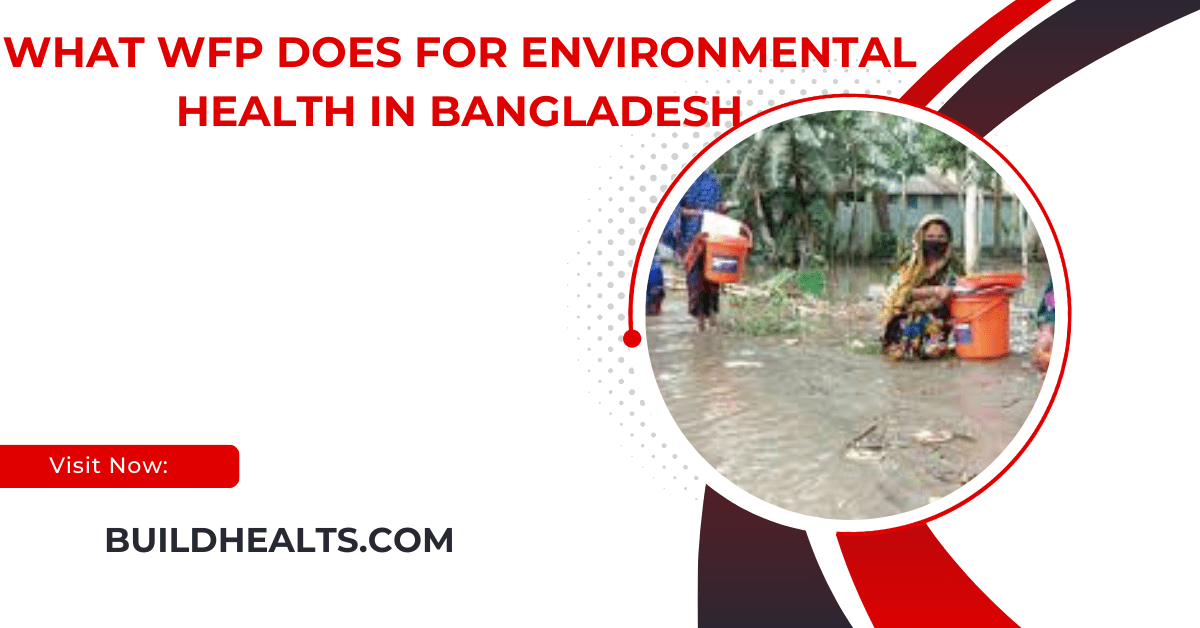The WFP improves environmental health in Bangladesh by tackling food insecurity and promoting sustainable practices, including food assistance and empowering women in agriculture.
The World Food Programme (WFP) is a key player in improving environmental health in Bangladesh, a country facing severe challenges due to climate change, natural disasters, and food insecurity. With a population of over 160 million, many people in Bangladesh struggle to access enough food and clean water.
This article explores how WFP addresses these issues and works towards a healthier environment and better living conditions for the people of Bangladesh.
What is the World Food Programme (WFP)?

The World Food Programme (WFP) is the food assistance arm of the United Nations, established in 1961. It is the world’s largest humanitarian organization focused on combating hunger and promoting food security.
In Bangladesh, WFP works closely with the government, NGOs, and local communities to deliver effective food assistance and improve the health of the environment. WFP’s core activities in Bangladesh include:
- Providing food assistance during emergencies.
- Supporting sustainable agricultural practices.
- Promoting nutrition education.
- Enhancing resilience to climate change.
By addressing these areas, WFP contributes to better environmental health and food security for the people of Bangladesh.
The Importance of Environmental Health in Bangladesh:
Environmental health is critical to the well-being of individuals and communities. In Bangladesh, several environmental challenges significantly impact public health:
1. Air Pollution
Air pollution is a major issue in urban areas of Bangladesh, with high levels of pollutants from vehicles, factories, and construction sites. According to the World Health Organization (WHO), air pollution is responsible for millions of premature deaths globally. In Bangladesh, this leads to:
- Respiratory Problems: Increased cases of asthma, bronchitis, and other lung diseases.
- Cardiovascular Diseases: Long-term exposure to polluted air can lead to heart diseases.
2. Water Quality
Access to clean drinking water remains a significant challenge for many Bangladeshis. According to UNICEF, about 4.3 million children under five years old suffer from acute malnutrition due to contaminated water sources. Waterborne diseases, such as cholera and diarrhea, are prevalent, especially in rural areas. The key issues include:
- Contaminated Water Supply: Many communities rely on unsafe water sources, which can lead to health crises.
- Flooding: Seasonal flooding can overwhelm sanitation systems, spreading disease.
3. Climate Change
Bangladesh is one of the countries most affected by climate change. Rising sea levels, increased flooding, and more frequent cyclones threaten food production and livelihoods. The effects of climate change include:
- Crop Damage: Extreme weather events can destroy crops and disrupt food supplies.
- Displacement: Many people are forced to leave their homes due to flooding and erosion, leading to increased poverty and health risks.
4. Deforestation
Rapid urbanization and agricultural expansion have resulted in significant deforestation in Bangladesh. Forests play a crucial role in maintaining environmental balance by:
- Supporting Biodiversity: Deforestation leads to the loss of habitats for many species.
- Regulating Climate: Trees help regulate local climates and reduce greenhouse gases.
Also read: Magnesium Welding Rods Health Hazards List – Key Health Hazards and Safety Tips
WFP’s Initiatives for Environmental Health:
WFP implements various programs to improve environmental health and promote sustainable practices in Bangladesh. Here are some key initiatives:
1. Food Assistance Programs
WFP provides essential food assistance to vulnerable communities, especially during emergencies caused by natural disasters. This assistance includes:
- Emergency Response: WFP quickly distributes food to communities affected by floods and cyclones. For instance, in 2020, WFP provided food assistance to over 1.2 million people affected by floods in northern Bangladesh.
- Cash-Based Transfers: In areas where markets are functioning, WFP offers cash-based transfers. This allows families to purchase food locally, supporting the local economy while ensuring access to diverse and nutritious food.
2. Promoting Sustainable Agriculture

WFP encourages sustainable agricultural practices that help farmers improve food security while protecting the environment. Key actions include:
- Training and Capacity Building: WFP provides training to farmers on sustainable practices such as.
- Crop Rotation: Alternating the types of crops grown in a field to improve soil health and reduce pests.
- Organic Farming: Using natural fertilizers and pest control methods to minimize chemical use.
- Support for Climate-Resilient Crops: WFP promotes the cultivation of crops that can withstand extreme weather conditions. This includes drought-resistant varieties and salt-tolerant crops, helping farmers adapt to changing climates.
3. Nutrition Education
Nutrition education is essential for improving health outcomes, particularly for vulnerable populations. WFP focuses on:
- Awareness Campaigns: These campaigns inform communities about the importance of a balanced diet rich in vitamins and minerals. WFP collaborates with local health workers to conduct workshops and distribute educational materials.
- School Feeding Programs: WFP’s school feeding programs provide nutritious meals to children, improving their health and encouraging school attendance. In 2021, WFP served over 1.6 million children in Bangladesh through its school feeding initiatives.
4. Enhancing Resilience to Climate Change
WFP recognizes the need for communities to adapt to climate change to protect food security and health. Initiatives include:
- Disaster Risk Reduction: WFP works with local governments to create disaster risk reduction plans. These plans include early warning systems and community training to prepare for and respond to disasters effectively.
- Community Engagement: Engaging local communities in discussions about climate change helps them understand its impacts. WFP facilitates workshops where communities can share their experiences and develop strategies to adapt.
5. Supporting Women Empowerment
Empowering women is a key focus for WFP, as women play a crucial role in food production and family nutrition. WFP’s efforts include:
- Women’s Groups: WFP supports women’s groups that focus on sustainable agriculture, nutrition, and income generation. These groups empower women with the knowledge and skills to improve their families’ health and livelihoods.
- Access to Resources: WFP works to ensure women have access to resources such as microcredit and training. This enables them to invest in their farms and improve food production.
Who is the country director of WFP Bangladesh?

The current Country Director of the World Food Programme (WFP) in Bangladesh is Sonia Nasir. In her role, she is responsible for managing WFP’s operations and programs that address food insecurity and malnutrition in the country. With extensive experience in humanitarian aid and development, Sonia Nasir leads various initiatives aimed at improving food security and nutrition for vulnerable populations, particularly in the context of climate change and its impact on agriculture.
Under her leadership, WFP Bangladesh has focused on providing emergency assistance during crises, such as natural disasters and the Rohingya refugee influx, while also working on long-term solutions to enhance resilience among local communities.
This includes promoting sustainable agricultural practices, improving access to nutritious food, and supporting livelihoods. Her commitment to collaboration with the Bangladeshi government and other partners is vital for implementing effective strategies that aim to alleviate hunger and promote environmental health in the region.
Impact of WFP’s Work:
The initiatives implemented by WFP in Bangladesh have significantly impacted environmental health and food security:
1. Improved Food Security
By providing food assistance and promoting sustainable agricultural practices, WFP has helped improve food security in vulnerable communities. According to WFP, food insecurity in targeted areas has reduced by 30% since 2018, ensuring families have better access to nutritious food.
2. Enhanced Agricultural Productivity
Training and support for sustainable agriculture have led to increased agricultural productivity. Farmers report an average yield increase of 20-25% after participating in WFP training programs. These gains are vital for improving the livelihoods of farmers and their families.
3. Increased Community Resilience
WFP’s focus on disaster risk reduction and climate change adaptation has strengthened community resilience. People are now better prepared for natural disasters, which has minimized the impact on health and food security. For example, communities involved in WFP’s resilience programs reported a 40% decrease in crop loss during floods.
4. Better Health Outcomes
Nutrition education and school feeding programs have contributed to improved health outcomes, especially for children. School attendance has increased by 15% in areas with WFP school feeding programs, demonstrating the link between nutrition and education.
5. Empowered Women
WFP’s efforts to empower women have led to increased participation in agricultural production and decision-making. Women involved in WFP-supported programs report higher incomes and improved family nutrition. This empowerment is crucial for fostering sustainable development in communities.
Also read: Magnesium Rods Health Hazards List – What You Need to Know!
Who is the country director of WFP Bangladesh?
The current Country Director of the World Food Programme (WFP) in Bangladesh is Sonia Nasir. In her role, she is responsible for managing WFP’s operations and programs that address food insecurity and malnutrition in the country.
With extensive experience in humanitarian aid and development, Sonia Nasir leads various initiatives aimed at improving food security and nutrition for vulnerable populations, particularly in the context of climate change and its impact on agriculture.
Under her leadership, WFP Bangladesh has focused on providing emergency assistance during crises, such as natural disasters and the Rohingya refugee influx, while also working on long-term solutions to enhance resilience among local communities.
This includes promoting sustainable agricultural practices, improving access to nutritious food, and supporting livelihoods. Her commitment to collaboration with the Bangladeshi government and other partners is vital for implementing effective strategies that aim to alleviate hunger and promote environmental health in the region.
FAQ’s
1. What is WFP?
The World Food Programme (WFP) is the food assistance branch of the United Nations, focusing on combating hunger and promoting food security globally.
2. How does WFP improve food security in Bangladesh?
WFP improves food security by providing emergency food assistance, promoting sustainable agricultural practices, and conducting nutrition education programs.
3. What challenges does Bangladesh face regarding environmental health?
Bangladesh faces challenges such as air pollution, water quality issues, climate change impacts, and deforestation, all of which threaten public health and food security.
4. What programs does WFP have for women in Bangladesh?
WFP supports women’s groups focused on sustainable agriculture and nutrition, providing access to resources like microcredit and training to enhance their economic empowerment.
5. What impact has WFP’s work had in Bangladesh?
WFP’s initiatives have led to improved food security, enhanced agricultural productivity, increased community resilience to disasters, better health outcomes, and empowered women in agricultural decision-making.
Conclusion
In summary, the World Food Programme (WFP) significantly enhances environmental health and food security in Bangladesh through targeted initiatives. By promoting sustainable practices and providing essential assistance, WFP helps communities adapt to climate challenges. Its efforts lead to improved nutrition, increased agricultural productivity, and empowered women, fostering overall community resilience.




